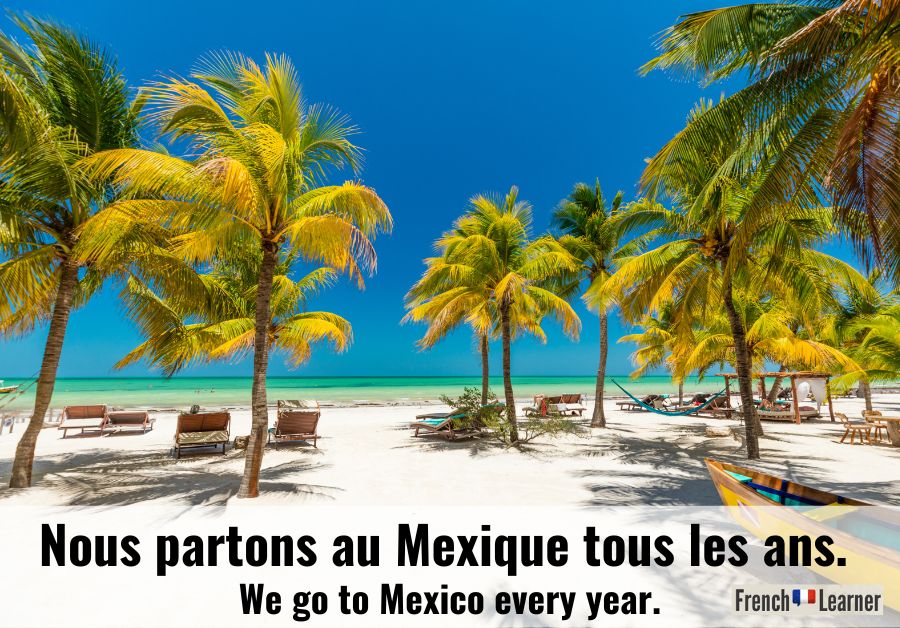There are two ways to say year in French: an and année. In this post we’ll examine the difference between an vs année with very specific example sentences. In a nutshell, “an” is used for describing units of time and “année” is often attached to other words such as adjectives.
an, année
year

An vs année – “year” in French
Pronunciation
Before we go any further, let’s have a good look at the pronunciation of both an and année. “An” is simply the nasal “ɑ̃” sound that can be found in both the “en” and “an” in the word “enfant” (child).
an
The word année sounds like “ah-nay”.
année
When to use “an”
The following section will cover when to use “an”. Again, think of “un an” as a unit of time.
Describing age
To describe somebody’s age in French use “avoir“ (to have) plus the number of years.
Marc a vingt ans.
Marc is 20 years-old.
For the above two example sentences, using “année” would be wrong. You cannot use “année” when talking about your age.
Use “an” to describe turning a certain age. For example:
Marie va avoir vingt-cinq ans en mars.
Marie will be 25 years-old in March.
How many years an action has occurred
Again, think of “an” as a unit of time. Use “an” when talking about how long you’ve been doing something, how long it’s been since an event occurred or when you will do something in the future. For example:
On habite ici depuis trois ans.
We’ve been living here for three years.
Using “année” for the above to example sentences would sound very awkward to the French ear.
Last year, next year, etc.
When talking about “last year” or “next year”, use “an”. For example.
Je suis allé à Paris l’an dernier.
I went to Paris last year.
L’an prochain nous partons en Espagne.
Next year we’re going to Spain.

That said, you can use the word “année” in both of these situations. You can say “l’année prochaine” to mean next year and “l’année dernière” to mean last year.
To say “this year” you would use “année”. Saying “an” here would sound awkward. For example:
Qu’est-ce que tu fais cette année ?
What are you doing this year?
Every year
When saying “year” in the context of “every year” you must use “an”. The expression is “tous les ans”. For example:
Nous partons au Mexique tous les ans.
We go to Mexico every year.

When to use année
In general, use the word “année” when it’s attached to another word, such as an adjective. Also use “année” with quantifier words (each, few, many).
Good year, difficult year, etc.
Here are some examples of sentences where the quality of the year is being described with an adjective. Using the word “an” for these sounds would sound awkward to the French year.
Je passe une bonne année.
I’m having a good year.
Elle passe une année difficile.
She’s having a hard year.
This year
To say “this year”, use the demonstrative adjective “cette” plus “année”. Again, using “an” wouldn’t sound right. For example:
Qu’est-ce que vous allez faire cette année?
What are you going to do this year?
Referring to a decade
Use the word “année” when referring to a decade, such as the 1970s or 1980s. The following example sentence will include both “an” and “année”. An, as you can recall from above, is referring to a unit of time.
J’ai passé un an en France aux années 90.
I spent a year in France in the 90s.
Les gens apprécient la musique des années 60.
People like music from the 1960s.
Ordinal numbers
When counting years with ordinal numbers (first, second, third, etc.), use année.
- C’est la troisième année de notre mariage. It’s the third year of our marriage.
The word annèe can also be used to refer to grades in the Canadian school system. For example:
- Marc est en cinqième année. Marc in the fifth grade.
Every year
To say “every year” use “chaque année”. For example:
- Je passe l’hiver dans les Alpes chaque année depuis mon enfance. I’ve been spending the winter in the Alps each year since my childhood.
Several years or a few years
For “several years” use “plusieurs années” and for “a few years” use “quelques années”. For example:
- Je voudrais passer quelques années en Europe. I’d like spend a few years in Europe.
- Elle habite a Marseille depuis plusieurs années. She’s been living in Marseille for several years.
So many years, too many years
To express so many years and too many years, use année. For example:
- Ils se disputent depuis tellement d’années. They’ve been arguing for so many years.
- Antoine fume depuis trop d’années. Antoine has been smoking for too many years.
How many years
Use “combien d’années” when asking about “how many years”. For example:
- Depuis combien d’années habitez-vous en France? How many years have you lived in France?
For years
When expressing “for years”, use “des années”. For example:
- Il est comme ca depuis des années. He’s been like that for years.
Conclusion
As you can see, figuring whether to say “an” or “année” to express the year in French can be quite a challenge! My good friend, Camille, at FrenchToday also provides a lesson covering an vs année on this page.
See all Word of the Day lessons


